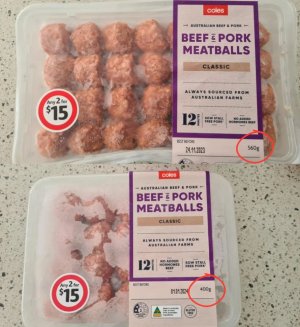Exposed: How Coles' 'cheapskate' tactics on meat could affect your grocery bill!
By
- Replies 53
The rising cost of groceries is a concern for many Australians, especially for people on fixed incomes like pensions. But what if you're paying more for less without even realising it?
A recent incident involving a Coles shopper has brought to light a seemingly underhanded tactic employed by supermarkets to subtly increase prices.
The disgruntled shopper shared photos on social media showing two nearly identical packets of beef and pork meatballs purchased from Coles.
Both packets were advertised as two for $15, but there was a significant difference in weight.
The first packet weighed 560 grams, while the second, purchased a month later, weighed only 400 grams.
The shopper pointed out the whopping 28 per cent reduction in meatballs with no corresponding decrease in price.
'Coles (Australian supermarket duopoly cheapskates) have the gall to do a 28 per cent shrinkage in a month,' the shopper wrote online.
'Thank God you can still get the two for $15 special?!'
The post quickly gained traction, amassing thousands of reactions and hundreds of comments.
This shopper's frustration resonated with many Australians feeling the pinch of rising food prices.
'I barely go [to Coles] anymore, and this is why,' one person wrote.
'It’s about a 25-minute drive to ALDI, but [it] more than pays for itself.'
Another commented, 'I have probably a year left before I can’t afford to buy food anymore if things keep going this way.'
‘We’re being conned and ripped off, and there's no way around it,’ someone expressed.
‘Shopping for food used to be something I really enjoyed doing and nowadays it just feels stressful and upsetting! Every time I buy something, it's a little bit more expensive and a bit s**t and smaller than it was.’
Coles declined to comment on the matter, but this incident raises questions about the pricing practices of supermarket giants.
Are they exploiting consumers to boost their profits amid rising inflation?
Professor Roberta Crouch from the College of Business, Government and Law at Flinders University believes so.
'One of the ways to try to hold the perception of the same price, but increase your price and therefore increase your margin, is to reduce the size of packaging,' she told a news source.
However, she also acknowledged that supermarkets are grappling with rising costs, such as fuel and power bills.
'Fuel is one of their inputs that they always cite. If fuel prices are high, then grocery prices tend to follow...especially perishable items like fresh fruit and vegetables. It's not like you can put it on a train and wait.'
So, what can consumers do to protect themselves from these sneaky tactics? Professor Crouch advises shoppers to be vigilant and understand how pricing works.
'Look at that label where it gives you the price per unit. Consumers have really got to be on their toes and try to understand how the pricing works, because all of these things can be manipulated in order to make it appear that a price has been held.'
The Coles meatball incident comes amid calls for greater transparency from Coles and Woolworths regarding their pricing practices.
A senate inquiry into allegations of price gouging is underway.
'There's a lot of talk going on right now about Coles and Woolies being more transparent about how much of their margin goes to the farmer,' Professor Crouch said.
'Because the farmers are always talking about the fact that they're pushed to the limit on pricing. So there are some calls for some transparency there and it'll be interesting to see if that happens.'
In the meantime, consumers must stay alert and informed to ensure they're getting the best value for their money.
While the Coles meatball incident is a stark example, it's not the only way supermarkets subtly increase prices.
Here are a few other tactics to watch out for:
1. Shrinkflation: This is when the size or quantity of a product is reduced, but the price remains the same. It's a sneaky way for companies to pass on cost increases without raising prices.
2. Changing product placement: Supermarkets often place more expensive items at eye level, where they're more likely to catch your attention. Cheaper alternatives may be on higher or lower shelves.
3. Promoting 'special' deals: Just because an item is labelled as 'on sale' or 'special' doesn't necessarily mean it's a good deal. Always check the unit price to ensure you're getting the best value.
4. Bundling products: Sometimes, supermarkets bundle products and sell them at a 'discounted' price. However, if you don't need all the items in the bundle, you might end up spending more than necessary.
5. Using 'premium' product lines: Many supermarkets have their own 'premium' product lines, which are often more expensive than their regular or budget lines. While these products may be of higher quality, they're not always worth the extra cost.
By being aware of these tactics, you can make smarter shopping decisions and get the most bang for your buck.

What are your thoughts on this issue, members? Have you noticed any sneaky price increases at your local supermarket? Share your experiences in the comments below.
A recent incident involving a Coles shopper has brought to light a seemingly underhanded tactic employed by supermarkets to subtly increase prices.
The disgruntled shopper shared photos on social media showing two nearly identical packets of beef and pork meatballs purchased from Coles.
Both packets were advertised as two for $15, but there was a significant difference in weight.
The first packet weighed 560 grams, while the second, purchased a month later, weighed only 400 grams.
The shopper pointed out the whopping 28 per cent reduction in meatballs with no corresponding decrease in price.
'Coles (Australian supermarket duopoly cheapskates) have the gall to do a 28 per cent shrinkage in a month,' the shopper wrote online.
'Thank God you can still get the two for $15 special?!'
The post quickly gained traction, amassing thousands of reactions and hundreds of comments.
This shopper's frustration resonated with many Australians feeling the pinch of rising food prices.
'I barely go [to Coles] anymore, and this is why,' one person wrote.
'It’s about a 25-minute drive to ALDI, but [it] more than pays for itself.'
Another commented, 'I have probably a year left before I can’t afford to buy food anymore if things keep going this way.'
‘We’re being conned and ripped off, and there's no way around it,’ someone expressed.
‘Shopping for food used to be something I really enjoyed doing and nowadays it just feels stressful and upsetting! Every time I buy something, it's a little bit more expensive and a bit s**t and smaller than it was.’
Coles declined to comment on the matter, but this incident raises questions about the pricing practices of supermarket giants.
Are they exploiting consumers to boost their profits amid rising inflation?
Professor Roberta Crouch from the College of Business, Government and Law at Flinders University believes so.
'One of the ways to try to hold the perception of the same price, but increase your price and therefore increase your margin, is to reduce the size of packaging,' she told a news source.
However, she also acknowledged that supermarkets are grappling with rising costs, such as fuel and power bills.
'Fuel is one of their inputs that they always cite. If fuel prices are high, then grocery prices tend to follow...especially perishable items like fresh fruit and vegetables. It's not like you can put it on a train and wait.'
So, what can consumers do to protect themselves from these sneaky tactics? Professor Crouch advises shoppers to be vigilant and understand how pricing works.
'Look at that label where it gives you the price per unit. Consumers have really got to be on their toes and try to understand how the pricing works, because all of these things can be manipulated in order to make it appear that a price has been held.'
The Coles meatball incident comes amid calls for greater transparency from Coles and Woolworths regarding their pricing practices.
A senate inquiry into allegations of price gouging is underway.
'There's a lot of talk going on right now about Coles and Woolies being more transparent about how much of their margin goes to the farmer,' Professor Crouch said.
'Because the farmers are always talking about the fact that they're pushed to the limit on pricing. So there are some calls for some transparency there and it'll be interesting to see if that happens.'
In the meantime, consumers must stay alert and informed to ensure they're getting the best value for their money.
While the Coles meatball incident is a stark example, it's not the only way supermarkets subtly increase prices.
Here are a few other tactics to watch out for:
1. Shrinkflation: This is when the size or quantity of a product is reduced, but the price remains the same. It's a sneaky way for companies to pass on cost increases without raising prices.
2. Changing product placement: Supermarkets often place more expensive items at eye level, where they're more likely to catch your attention. Cheaper alternatives may be on higher or lower shelves.
3. Promoting 'special' deals: Just because an item is labelled as 'on sale' or 'special' doesn't necessarily mean it's a good deal. Always check the unit price to ensure you're getting the best value.
4. Bundling products: Sometimes, supermarkets bundle products and sell them at a 'discounted' price. However, if you don't need all the items in the bundle, you might end up spending more than necessary.
5. Using 'premium' product lines: Many supermarkets have their own 'premium' product lines, which are often more expensive than their regular or budget lines. While these products may be of higher quality, they're not always worth the extra cost.
By being aware of these tactics, you can make smarter shopping decisions and get the most bang for your buck.
Key Takeaways
- A Coles shopper expressed frustration over perceived shrinkflation in meatball packet sizes, with a 28 per cent reduction over a month.
- The reduction in product size has led to customer dissatisfaction, as revealed by online reactions, amid rising food prices in Australia.
- Coles did not provide a comment on this specific case, but the practice of reducing package sizes is part of a broader strategy to increase margins without raising prices, as explained by Professor Roberta Crouch.
- There is growing pressure for Coles and Woolworths to be more transparent about product pricing and how much of their margins are passed on to farmers, with a senate inquiry into allegations of price gouging underway.
- There are a few tactics that supermarkets use to subtly increase prices such as Shrinkflation, Changing product placement, Promoting 'special' deals, Bundling products, and Using 'premium' product lines.
What are your thoughts on this issue, members? Have you noticed any sneaky price increases at your local supermarket? Share your experiences in the comments below.








